Even…
I’m feeling prickly today. Poetry, I think, is what’s called for.
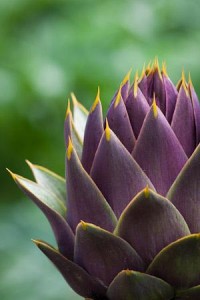 My Species
My Species
by Jane Hirschfield
even
a small purple artichoke
boiled
in its own bittered
and darkening
waters
grows tender,
grows tender and sweet
patience, I think,
my species
keep testing the spiny leaves
the spiny heart
One More
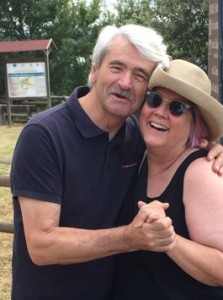 One more poem from Mary Oliver…this one titled: Wild, Wild.
One more poem from Mary Oliver…this one titled: Wild, Wild.
And one more photo from Italy…this one of me and Alfeo, the owner of Le Santucce, who spoke to me always in Italian, and always with kindness, humor, and joyful affection.
Wild, Wild
This is what love is:
the dry rose bush the gardener, in his pruning, missed
suddenly bursts into bloom.
A madness of delight; and obsession.
A holy gift, certainly.
But often, alas, improbable.
Why couldn’t Romeo have settled for someone else?
Why couldn’t Tristan and Isolde have refuse
the shining cup
which would have left peaceful the whole kingdom?
Wild sings the bird of the heart in the forests
of our lives.
Over and over Faust, standing in the garden, doesn’t know
anything that’s going to happen, he only sees
the face of Marguerite, which is irresistible.
And wild, wild sings the bird.
***
I love Alfeo! (Love is always wild. Even when it’s not romantic.)
Me and Not Me
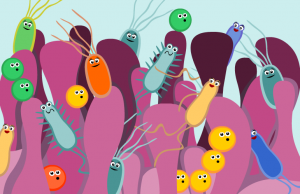 Time for a little poetry…but I’ll give Mary Oliver a rest. For today:
Time for a little poetry…but I’ll give Mary Oliver a rest. For today:
My Proteins
by Jane Hirshfield
The have discovered, they say,
the protein of itch–
natriuretic polypeptide b–
and that it travels its own distinct pathway
inside my spine.
As do pain, pleasure, and heat.
A body it seems is a highway,
a cloverleaf crossing
well built, well traversed.
Some of my going north, some going south.
Ninety percent of my cells, they have discovered,
are not my own person,
they are other beings inside me.
As ninety-six percent of my life in not my life.
Yet I, they say, am they–
my bacteria and yeasts,
my father and mother,
grandparents, lovers,
my drivers talking on cell phones,
my subways and bridges,
my thieves, my police
who chase my self night and day.
My proteins, apparently also me,
fold the shirts.
I find in this crowded metropolis
a quiet corner,
where I build of not-me Lego blocks
a bench,
pigeons, a sandwich
of rye bread, mustard, and cheese.
It is me and is not,
the hunger
that makes the sandwich good.
It is not me then is,
the sandwich–
a mystery neither of us
can fold, unfold, or consume.
Fifteen Minutes
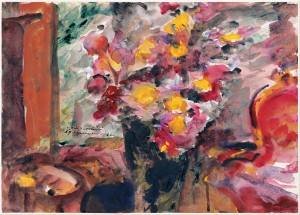 And now, a little more from Mary Oliver:
And now, a little more from Mary Oliver:
Freshen the Flowers, She Said
So I put them in the sink, for the cool porcelain
was tender,
and took out the tattered and cut each stem
on a slant,
trimmed the black and raggy leaves, and set them all–
roses, delphiniums, daisies, iris, lilies,
and more whose names I don’t know, in bright new water–
gave them
a bounce upward at the end to let them take
their own choice of position, the wheels, the spurs,
the little sheds of the buds. It took, to do this,
perhaps fifteen minutes.
Fifteen minutes of music
with nothing playing.
Only a Window
 And now a little Mary Oliver, from Have You Ever Tried to Enter the Long Black Branches:
And now a little Mary Oliver, from Have You Ever Tried to Enter the Long Black Branches:
Listen, are you breathing just a little, and calling it a life?
While the soul, after all, is only a window,
and the opening of the window no more difficult
than the wakening from a little sleep.
After Excitement
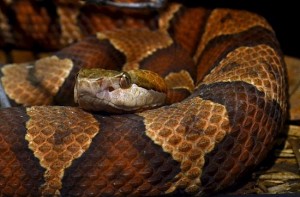 Can’t get enough Mary Oliver:
Can’t get enough Mary Oliver:
May
What lay on the road was no mere handful of snake. It was the copperhead at last, golden under the street lamp. I hope to see everything in this world before I die. I knelt on the road and stared. Its head was wedge-shaped and fell back to the unexpected slimness of a neck. The body itself was thick, tense, electric. Clearly this wasn’t black snake looking down from the limbs of a tree, or green snake, or the garter, whizzing over the rocks. Where these had, oh, such shyness, this one had none. When I moved a little, it turned and clamped its eyes on mine; then it jerked toward me. I jumped back and watched as it flowed on across the road and down into the dark. My heart was pounding. I stood a while, listening to the small sounds of the woods and looking at the stars. After excitement we are so restful. When the thumb of fear lifts, we are so alive.
What Did You Think?
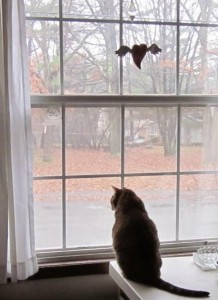 There was a lot going on yesterday: getting set up with an editing “gig” for a very cool upcoming dharma book, listening to the good news from a very dear friend whose husband does NOT have bladder cancer after all, talking with a mentor about how to respond to a toxic situation, and spending a tender evening at the home of that previously mentioned former-suitor and his current wife, a long-out-of-touch book-club friend. So no time for posting yesterday.
There was a lot going on yesterday: getting set up with an editing “gig” for a very cool upcoming dharma book, listening to the good news from a very dear friend whose husband does NOT have bladder cancer after all, talking with a mentor about how to respond to a toxic situation, and spending a tender evening at the home of that previously mentioned former-suitor and his current wife, a long-out-of-touch book-club friend. So no time for posting yesterday.
Instead, I offer this, from West Wind by Mary Oliver:
And what did you think love would be like? A summer day? The brambles in their places, and the long stretches of mud? Flowers in every field, in every garden, with their soft beaks and their pastel shoulders? On one street after another, the litter ticks in the gutter. In one room after another, the lovers meet, quarrel, sicken, break apart, cry out. One or two leap from windows. Most simply lean, exhausted, their thin arms on the sill. They have done all that they could. The golden eagle, that lives not far from here, has perhaps a thousand tiny feathers flowing from the back of its head, each one shaped like an infinitely small but perfect spear.
Perfectly Wild
 I think it’s time for a little Mary Oliver:
I think it’s time for a little Mary Oliver:
In Pobiddy, Georgia
Three women
climb from the car
in which they have driven slowly
into the churchyard.
They come toward us, to see
what we are doing.
What we are doing
is reading the strange,
wonderful names
of the dead.
One of the women
speaks to us–
after we speak to her.
She walks with us and shows us,
with downward-thrust finger,
which of the dead
were her people.
She tells us
about two brothers, and an argument,
and a gun–she points
to one of the slabs
on which there is a name,
some scripture, a handful of red
plastic flowers. We ask her
about the other brother.
“Chain gang,” she says,
as you or I might say
“Des Moines,” or “New Haven.” And then,
“Look around all you want.”
The younger woman stands back, in the stiff weeds,
like a banked fire.
The third one–
the oldest human being we have ever seen in our lives–
suddenly drops to the dirt
and begins to cry. Clearly
she is blind, and clearly
she can’t rise, but they lift her, like a child,
and lead her away, across the graves, as though,
as old as anything could ever be, she was, finally,
perfectly finished, perfectly heartbroken, perfectly wild.
Of What She Sings
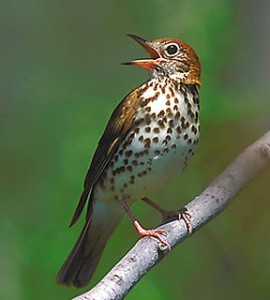 Today feels like a good day for this poem by Mary Oliver:
Today feels like a good day for this poem by Mary Oliver:
The Poet With His Face in His Hands
You want to cry aloud for your
mistakes. But to tell the truth the world
doesn’t need any more of that sound.
So if you’re going to do it and can’t
stop yourself, if your pretty mouth can’t
hold it in, at least go by yourself across
the forty fields and the forty dark inclines
of rocks and water to the place where
the falls are flinging out their white sheets
like crazy, and there is a cave behind all that
jubilation and water-fun and you can
stand there, under it all, and roar all you
want and nothing will be disturbed; you can
drip with despair all afternoon and still,
on a green branch, its wings just lightly touched
by the passing foil of water, the thrush,
puffing out its spotted breast, will sing
of the perfect, stone-hard beauty of everything.
But What Action?
 As many of you know, the Community Dharma Leader (CDL) program starts up at Spirit Rock next month with a 7-day retreat/workshop. Since one of our first homework assignments is to read Joanna Macy’s Coming Back to Life: The Updated Guide to the Work that Reconnects, it’s safe to assume that a big emphasis will be on Socially Engaged Buddhism.
As many of you know, the Community Dharma Leader (CDL) program starts up at Spirit Rock next month with a 7-day retreat/workshop. Since one of our first homework assignments is to read Joanna Macy’s Coming Back to Life: The Updated Guide to the Work that Reconnects, it’s safe to assume that a big emphasis will be on Socially Engaged Buddhism.
Which I’m not that thrilled about.
Because, frankly, the whole ACTIVIST thing is really kind of annoying to me. (Aversion!) But just going off on retreat all the time is not the answer. LIVING what I’ve learned on retreat is what feels most engaging to me. But what, in terms of specific activities, would that mean?
Once again I turn to Mary Oliver…not for the answer, but for insight into the question:
What I Have Learned So Far
by Mary Oliver
Meditation is old and honorable, so why should I
not sit, every morning of my life, on the hillside,
looking into the shining world? Because, properly
attended to, delight, as well as havoc, is suggestion.
Can one be passionate about the just, the
ideal, the sublime, the holy, and yet commit
to no labor in its cause? I don’t think so.
All summations have a beginning, all effect has a
story, all kindness begins with the sown seed.
Thought buds toward radiance. The gospel of
light is the crossroads of–indolence, or action.
Be ignited, or be gone.
